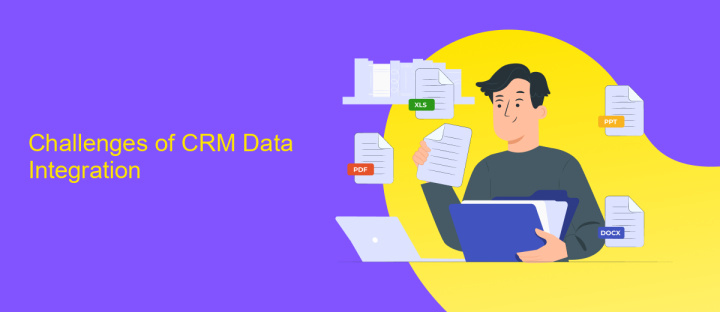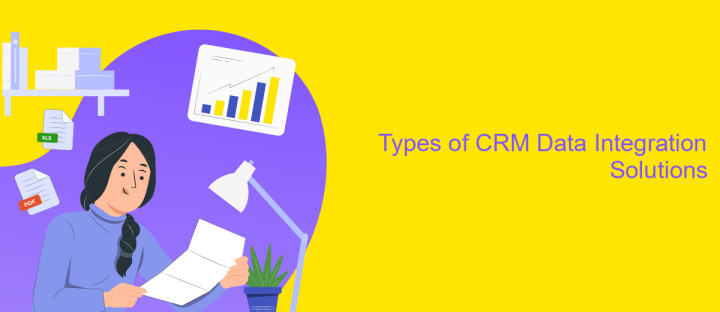CRM Data Integration Solutions
In today's competitive business environment, effective CRM data integration solutions are crucial for seamless customer relationship management. By consolidating data from various sources, these solutions enable organizations to gain comprehensive insights, streamline operations, and enhance customer engagement. This article explores the key benefits, challenges, and best practices associated with implementing CRM data integration solutions to drive business success.
Introduction
In today's competitive business environment, customer relationship management (CRM) systems have become indispensable for organizations aiming to maintain strong relationships with their clients. However, the true value of a CRM system is unlocked when it is integrated with other data sources within the organization. CRM data integration solutions enable businesses to consolidate information from various platforms, providing a unified view of customer interactions and facilitating more informed decision-making.
- Streamlined data management
- Enhanced customer insights
- Improved operational efficiency
- Better decision-making capabilities
- Increased customer satisfaction
By leveraging CRM data integration solutions, organizations can break down data silos and ensure that all relevant information is easily accessible to those who need it. This holistic approach not only fosters better communication and collaboration within the company but also empowers businesses to deliver personalized and timely services to their customers. Ultimately, investing in CRM data integration is a strategic move that can drive growth and success in the long term.
Challenges of CRM Data Integration

Integrating CRM data presents several challenges, primarily due to the diverse nature of data sources and formats. Different systems often have their own data structures and protocols, making seamless integration complex. Ensuring data consistency and accuracy during the transfer process is another significant hurdle, as discrepancies can lead to misinformation and poor decision-making. Additionally, real-time data synchronization is crucial for maintaining up-to-date records, yet it demands robust infrastructure and advanced technical expertise.
Security concerns also play a pivotal role in CRM data integration. Sensitive customer information must be protected during the transfer and storage processes, necessitating stringent security measures. Moreover, the integration process can be time-consuming and resource-intensive, requiring dedicated personnel and continuous monitoring. Tools like ApiX-Drive can alleviate some of these challenges by offering automated, user-friendly integration solutions that support various data sources and ensure secure, real-time data synchronization. Such platforms simplify the integration process, allowing businesses to focus on leveraging their CRM data effectively.
Benefits of CRM Data Integration Solutions

Integrating CRM data solutions can profoundly enhance business operations by centralizing customer information and streamlining workflows. When data from various sources is unified, it provides a comprehensive view of customer interactions, enabling more informed decision-making and personalized customer experiences.
- Improved Data Accuracy: Consolidating data from different platforms reduces the risk of errors and duplicates, ensuring that the information is reliable and up-to-date.
- Enhanced Customer Insights: With integrated data, businesses can gain deeper insights into customer behaviors and preferences, facilitating targeted marketing strategies.
- Increased Efficiency: Automating data integration processes saves time and resources, allowing teams to focus on core business activities rather than manual data entry.
- Better Collaboration: Unified data enables seamless communication and collaboration across departments, enhancing overall productivity and service quality.
- Scalability: CRM data integration solutions can easily scale with business growth, accommodating increasing data volumes and complexity.
Overall, CRM data integration solutions are essential for businesses seeking to optimize their operations, improve customer relationships, and drive growth. By leveraging these solutions, companies can achieve a competitive edge in today's data-driven market.
Types of CRM Data Integration Solutions

CRM data integration solutions come in various forms, each designed to address specific business needs and technical requirements. These solutions help organizations unify data from multiple sources, ensuring seamless communication and data consistency across different systems.
One common type of CRM data integration is the point-to-point integration. This method directly connects two systems, enabling real-time data exchange. However, it can become complex and difficult to manage as the number of integrated systems increases.
- Middleware Solutions: These act as intermediaries, facilitating data exchange between multiple systems without direct connections.
- Data Warehousing: This involves collecting and storing data from various sources into a centralized repository for analysis and reporting.
- API-Based Integration: APIs (Application Programming Interfaces) allow different software systems to communicate and share data efficiently.
- iPaaS (Integration Platform as a Service): Cloud-based platforms that offer tools and services to connect various applications and data sources.
Choosing the right CRM data integration solution depends on factors such as the complexity of your data environment, budget, and specific business needs. By selecting the appropriate method, organizations can ensure efficient data management and improved decision-making processes.
- Automate the work of an online store or landing
- Empower through integration
- Don't spend money on programmers and integrators
- Save time by automating routine tasks
Implementation and Best Practices
Implementing CRM data integration solutions requires careful planning and execution to ensure seamless data flow and accuracy. Begin by assessing your current CRM system and identifying the specific data points that need to be integrated. Establish clear objectives and select the appropriate tools and platforms that align with your business needs. ApiX-Drive, for instance, offers a user-friendly interface and robust integration capabilities, making it an excellent choice for automating data transfers between various applications.
Adopting best practices is crucial for successful CRM data integration. Regularly monitor and validate data to prevent discrepancies and maintain data integrity. Schedule periodic audits to identify and resolve any issues promptly. Additionally, ensure that all team members are adequately trained on the new system and integration processes. By following these best practices and utilizing reliable tools like ApiX-Drive, businesses can achieve efficient and effective CRM data integration, ultimately enhancing customer relationship management and driving growth.
FAQ
What is CRM data integration?
Why is CRM data integration important?
What are the common challenges in CRM data integration?
How can I automate CRM data integration?
What should I consider when choosing a CRM data integration solution?
Do you want to achieve your goals in business, career and life faster and better? Do it with ApiX-Drive – a tool that will remove a significant part of the routine from workflows and free up additional time to achieve your goals. Test the capabilities of Apix-Drive for free – see for yourself the effectiveness of the tool.


